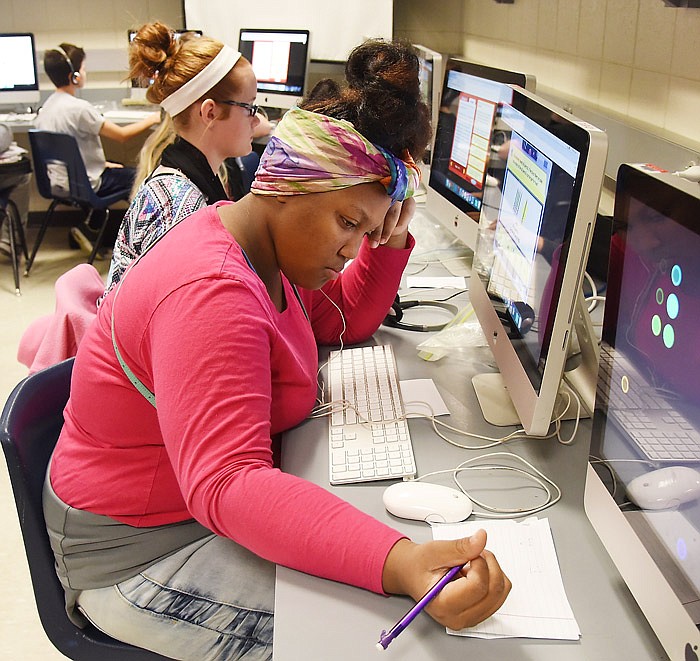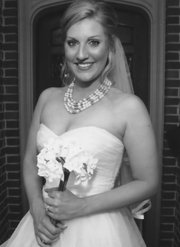Some teachers were a little skeptical when the district announced it would be adding another assessment for elementary and middle school students, but it could be among the most valuable teacher tools.
For the first time this year, Jefferson City Public Schools is implementing kindergarten- through eighth-grade reading and math assessments called i-Ready, a program that uses adaptive diagnostic and growth measurement tests to determine where students are with their learning - which areas they excel in and where they need more support.
For the past couple of weeks, teachers have been using the online diagnostic test as a beginning of the year assessment.
The results are very specific, said Dawn Berhorst, director of student information, planning and assessment.
It tells teachers which areas the student is above, below or right at grade level. For example, the results could indicate a student is at a sixth-grade level for vocabulary but a fourth-grade level for reading comprehension, she said. The test progresses depending on how well the student does. If the student gets a question right, then the test moves on to something more difficult. But if the student gets something wrong, then it goes to something easier.
The program automatically groups classroom students together based on their shared needs for added instruction and provides teachers additional instruction tools that address individual students' needs, Berhorst said.
"They're like lesson plans, checks for understanding, guiding questions or how you might assess a topic," Berhorst told the Board of Education on Sept. 19. "Even teachers who are content experts in their grade level - they might know math inside and out for third grade - but may not be familiar with second grade. It will really help with differentiated instruction."
The district has also purchased licenses for 700 math and 700 reading personalized learning tools. Students who are way below grade level in one of those areas can be selected for additional foundational learning, Berhorst said.
Those students will use the online learning tool at least 45 minutes a week to build skills. The tool teaches the topics and then tests the students on those areas. If the student does well, then the program moves on, and if they are still struggling to grasp the concept, then the program reintroduces the skills in a new way.
"It really meets kids where they're at," Berhorst said. "And it's based on the diagnostic test and where they were at with that."
Until this year, JCPS hasn't had a districtwide assessment that provides this many resources. But it's something teachers have been asking for a long time, she said.
Kindergarten teachers at Moreau Heights Elementary School created their own benchmark assessment, but it has some limits. Their test doesn't measure vocabulary. To do so, they'd have to create a series of picture cards to test each student on vocabulary.
The i-Ready program has a vocabulary component. It's also less time consuming than their current assessment, which took roughly a full day to get through at the beginning of the year.
April Steinman said she was among those who were a little skeptical about the new assessment.
"Some assessments haven't created useful data," she said. "We were hopeful to have one that would give us something we could use."
Steinman said one of the plus sides to i-Ready is it is user friendly. And it has a printout version of the results for parents laid out in language that's easy to understand.
Kindergarten teacher Lindsey Hammann said one of the first concerns about the test was they'd have to take it on the Chromebooks because i-Ready isn't completely iPad compatible, and it won't be until next year. The kindergartners have experience using the iPads, but they had never used a Chromebook. It ended up being a fairly easy transition, and the students were able to use them without many hiccups, she said.
Students in kindergarten through eighth grade will take a comprehensive diagnostic test in math and reading three times a year and shorter growth monitoring tests in between.
The district put together a selection committee to decipher what program they wanted to purchase for teachers. I-Ready was chosen partially because it's more than just an assessment, Berhorst said; the instruction tools are very valuable.
"We also did reference calls on the top two assessments, and the districts that used i-Ready had nothing but good things to say about the reporting and the support from the company," she said. "One district said, 'I think my teachers would cry mutiny if I tried to take it away now;' so that was encouraging."
The push to find a districtwide assessment came after teachers were surveyed last winter about their needs, and a request for a benchmark assessment was overwhelming.
Before this year, it wasn't fiscally possible to buy a program because the district was spending roughly $2 million a year to renovate the schools. When Superintendent Larry Linthacum started at the district, he decided to suspend the renovations and infuse that money into curriculum improvements. The district decided to partner with the International Leadership in Education Center to update and align its curriculum, and the i-Ready program is another piece of improving student learning.
Chief Financial Officer Jason Hoffman previously told the News Tribune the district budgeted $150,000 for the assessment and paid roughly $105,000 for i-Ready.
Currently there isn't a districtwide assessment for high school. The high school principals said they needed something more course-based, and Berhorst has yet to find something that caters to that.
There are some high school students using i-Ready who are needing some foundational skills, but it's a small number, she said.
During the board's September meeting, many of the members expressed their strong support of i-Ready.
"I think this is really transformative, and I think this is something we've needed a long time," said Vice President Steve Bruce. "We talk about differentiated instruction, there's no way I could do that with 20-something children and having some of the kids above the average and some below the target. There are only so many hours in a day, and there are so many things we're competing on. How do you do that? That's why I'm so impressed with this."
Board member Pam Murray said it could make parent teacher conferences more meaningful.


